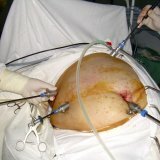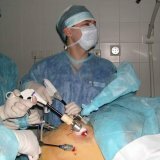Extragenital pathology in pregnant and parturient women

If to take into account that extragenital pathology in pregnant women leads to the threat of miscarriage, obstetric care of pregnant women and parturient women with EP is especially urgent. At the same time, the number of women who want to give birth to a child, but who are prone to extragenital pathologies, is constantly growing.
The modern approach considers pregnancy as one of extreme conditions of an organism. The functioning of most of the systems and organs of the female body during its course takes place on the verge of pathology. And periodically there come "critical deadlines", during which it can easily come to failure in the functioning, decompensation of certain organs and systems. The vast majority of diseases during pregnancy progresses, and the condition of the future parturient is deteriorating.
This is primarily due to the fact that the immune reactivity of the female body is being rebuilt, and since the fetus is estimated by him as an alien element, immune reactivity is in depression in order to avoid rejection. Especially fertile soil for progression during pregnancy are such diseases as:
- Mitral stenosis.
- Pyelonephritis.
- Hypertensive disease.
- Rheumatoid defects.
Secondly, during the fetal abortion the neuroendocrine regulation changes dramatically, and this leads to complication of the course:
- hypertension,
- diabetes mellitus,
- Adrenal and thyroid gland diseases.
Thirdly, physiological changes in the cardiovascular system occurring during the course of pregnancy lead to a worsening of the course of her illnesses, if before pregnancy they were in an unstable compensation stage. In addition, they can lead to false diagnosis.
Despite all the above factors, extragenital pathology in pregnant and parturient women is not always an obstacle to the birth of a child. Many, potentially dangerous to the health of pregnant and parturient women, can be treated.
Pregnancy and hypertension. Hypertensive crisis, leading to a sharp deterioration in health, persistent hyperreflexia, are indicators for emergency and necessary hospitalization of a pregnant woman in an obstetric hospital. Out-patient treatment of future parturient women who are prone to non-gestational arterial hypertension is, first of all, in the normalization of a woman's psychological state( the disease has a psychosomatic nature).This is:
- Physiological dream.
- Long-lasting soothing walks on fresh( preferably, forest) air.
- Herbal products that have sedative properties( motherwort, valerian).
- Calming conversations with family and friends, stimulating the establishment of an optimal psychological climate.
- Therapeutic diet: a restriction of five grams of table salt per day, table number 5 according to Pevzner, an increase in consumption of vegetables and fruits.
In addition, drug therapy is used, the goal of which is to stabilize blood pressure without sudden jumps and fluctuations.
Pregnancy and heart defects. Prolongation of pregnancy in women with heart defects depends on the type of malformations. But, in any case, the doctor is obliged to conduct with a pregnant conversation, during which he must inform her about the possible consequences of continuing the gestation. In addition, in case of absolute contraindications to pregnancy, discuss with a woman the possible forms of contraception( if pregnancy is only planned).
Congenital heart defects in pregnant and parturient women:
- with minor stenosis or valve insufficiency,
- with a slight left-to-right shunting,
- with a corrective defect of the interventricular septum and botulinum duct,
- with uncorrected uncomplicated ventricular septal defect,
are contraindications with minimal risk and are not considered an obstacle forProlongation of pregnancy.
The average level of risk and the possibility of continuing pregnancy has such an extragenital pathology as:
- mild stenosis and mitral insufficiency,
- an intraventricular septal defect with a blood bypass to fifty percent,
- acquired, but operated heart defects.
Absolute contraindications to pregnancy cause:
- decompensation of any( congenital or acquired) heart disease with the development of cardiac insufficiency of the third or fourth class( when palpitations and shortness of breath appear even with minimal physical exertion),
- marked cirrhosis,
- pulmonary hypertension.
However, the doctor, in order to avoid mistakes in the diagnosis, should not forget that sometimes even a normally occurring pregnancy can produce a false simulation of heart failure.
Pregnancy and rheumatism. The prognosis and possibility of pregnancy with rheumatism directly depend on the stage in which the disease and activity of the process is located, as well as the absence or presence of heart defects accompanying the disease, and the degree of their compensation. Rheumatism in an inactive form( rheumatism in anamnesis) is not an obstacle to the course of pregnancy. But it requires a course of anti-relapse therapy during fetal gestation and immediately, immediately after delivery.
Active rheumatic heart disease refers to absolute contraindications to pregnancy, as it can lead to death, even if the defect is not formed.



